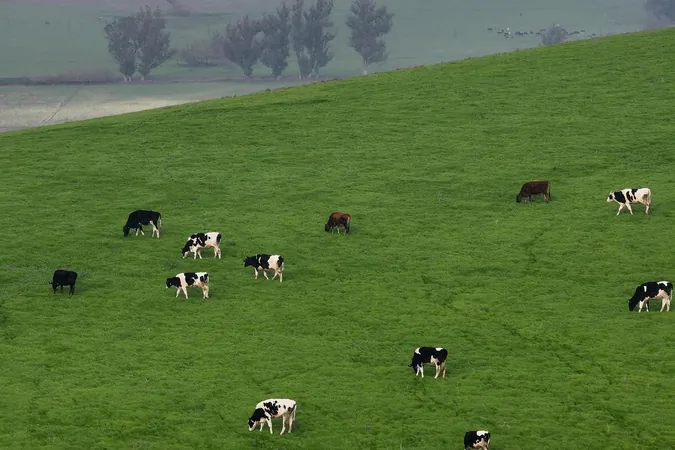
Emergency Declared in California as Avian Flu Hits Dairy Cows: What You Need to Know
2024-12-20
Author: Jia
SAN FRANCISCO - An alarming outbreak of avian flu has taken California's dairy industry by storm, leading to a state of emergency declared by Governor Gavin Newsom on December 18. This crisis has impacted 645 dairies across the state, which is the largest producer of milk in the U.S., and poses a significant risk to thousands of farmworkers.
Over the past four months, the H5N1 strain of the virus has infiltrated an alarming number of cattle herds despite rigorous biosecurity measures taken by ranchers. Dairy producers are reportedly calling it “COVID for cows” due to its rapid spread and devastating consequences.
“This is the worst crisis we’ve ever dealt with in the dairy industry in California,” said Anja Raudabaugh, CEO of Western United Dairies. The urgency to control the outbreak has left dairy farmers scrambling for solutions and protective measures.
While avian flu is primarily known for affecting birds, it can also infect mammals, including humans. So far in 2024, there have been 61 reported human cases of bird flu in the United States; however, most individuals have experienced mild symptoms. The first severe case of bird flu in a human was reported in Louisiana, raising concerns about how this virus could continue to evolve.
Although there’s no evidence suggesting the virus spreads easily between humans, experts highlight that close contact with infected animals is the primary method of transmission. The virus was first detected in cows early this year in Texas and has spread to at least 15 other states, stressing the need for heightened awareness and safety measures across the agricultural sector.
The U.S. Food and Drug Administration has assured the public that consuming eggs and pasteurized milk from unaffected cows is safe. However, infectious levels of the virus can be extremely high in milk from infected cows. Dr. Michael Payne, a veterinary medicine expert at the University of California, Davis, warns that farmers who are in direct contact with infected cows are at a heightened risk due to the concentrated nature of the virus in the milk.
Efforts to mitigate the outbreak have included restricting interaction between different dairy farms, frequent testing for the virus in milk, disinfecting equipment, and prohibiting workers from visiting other farms. Despite these precautions, the situation remains precarious for California's dairy industry.
As scientists work around the clock to address this looming threat, the looming question remains: what does the future hold for dairy producers and consumers? Stay tuned for updates as this story develops, and keep an eye on your milk sources!




 Brasil (PT)
Brasil (PT)
 Canada (EN)
Canada (EN)
 Chile (ES)
Chile (ES)
 España (ES)
España (ES)
 France (FR)
France (FR)
 Hong Kong (EN)
Hong Kong (EN)
 Italia (IT)
Italia (IT)
 日本 (JA)
日本 (JA)
 Magyarország (HU)
Magyarország (HU)
 Norge (NO)
Norge (NO)
 Polska (PL)
Polska (PL)
 Schweiz (DE)
Schweiz (DE)
 Singapore (EN)
Singapore (EN)
 Sverige (SV)
Sverige (SV)
 Suomi (FI)
Suomi (FI)
 Türkiye (TR)
Türkiye (TR)